The fast-food industry has experienced significant growth globally, with McDonald’s being one of the most prominent players in this market. Brazil, with its diverse culinary landscape, has embraced the iconic brand, creating unique menu items and adapting to local tastes. This exploration into McDonald’s journey in Brazil delves into its history, menu, cultural influence, supply chain, marketing strategies, corporate social responsibility, and the public’s perception of the brand.
History of McDonald’s in Brazil
McDonald’s first arrived in Brazil in 1979, opening its doors in the city of Rio de Janeiro. This marked the beginning of a new era for fast food in the country, as Brazilians embraced the convenience and style of American fast-food chains. Since then, McDonald’s has experienced tremendous growth in Brazil, becoming one of the largest fast-food chains in the country with over 1,000 stores currently in operation.
During its expansion throughout Brazil, McDonald’s has been recognized for its efforts to adapt its menu to the local tastes and cultural preferences of Brazilians. For example, the introduction of McDonald’s McMax Brazil, a sandwich designed specifically for Brazilian customers. This sandwich includes two beef patties topped with lettuce, tomato, cheddar cheese, special McMax sauce, and served on a toasted bun. This tailored offering demonstrates the company’s commitment to innovation and adapting to its diverse customer base in Brazil.
Additionally, McDonald’s has played a pivotal role in the employment sector in Brazil, providing jobs for thousands of Brazilians and contributing to the overall growth of the country’s economy. In 2005, McDonald’s was awarded the “Empresa do Ano” (Company of the Year) in Brazil for its commitment to CSR, with a focus on education, environment, and community development. As a responsible corporate citizen, McDonald’s has implemented various initiatives, such as the McBom Pra Você, which aims to provide better quality of life for McDonald’s employees and their families by offering training, health care benefits, and discounts on various goods and services.
Aside from its focus on adapting to local tastes and social responsibility, McDonald’s has also been successful in hosting promotional events for its Brazilian consumers. For example, in 2011, the company launched the “Família Feliz” (Happy Family) promotion, which offered customers the opportunity to win a trip to Disneyland in Orlando, Florida, by purchasing a Big Mac or McMax Brazil meal. The event was a great success, further cementing the bond between McDonald’s and its Brazilian customer base.
In recent years, McDonald’s has continued to innovate and adapt to the changing market in Brazil. Recognizing the rise of vegetarian and vegan diets, the company has introduced gourmet options like the McVeggie sandwich, showcasing the brand’s ability to diversify its menu offerings in response to customer demand. To further cater to the evolving needs of Brazilian consumers, McDonald’s has also joined forces with local delivery services like iFood, Rappi, and UberEats, allowing them to enjoy the iconic McMax Brazil and other favorites delivered straight to their door.
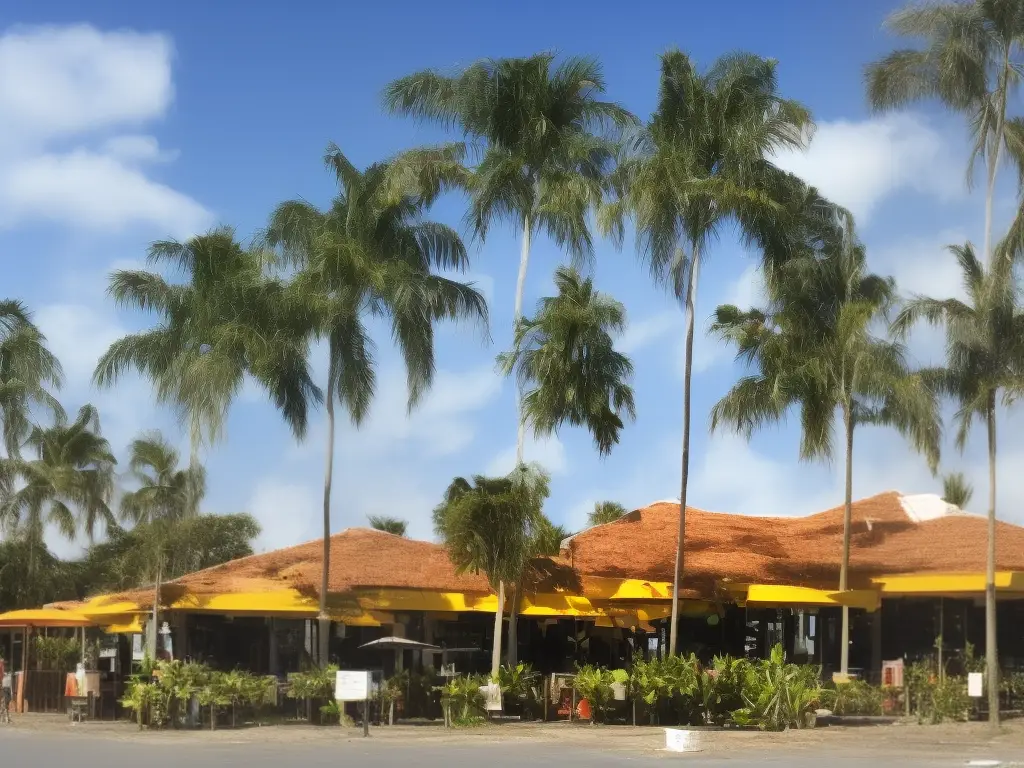
McMax Brazil Menu Items
This adaptability is a hallmark of McDonald’s, as the company is known for tailoring its menu offerings to align with local tastes and preferences. In Brazil, McDonald’s has not only incorporated sensibilities like vegetarianism but also created menu items that reflect the rich culinary heritage and diversity of the nation. These local adaptations further cement McDonald’s as a favorite eating option for Brazilian customers, while also contributing to the brand’s signature global appeal.
The McMax Brazil burger is a signature item that is designed to appeal to Brazilian customers who have a preference for meatier meals. It features two 100% beef patties, a slice of cheddar cheese, lettuce, tomatoes, onions, and a special sauce sandwiched between a sesame seed bun.
Mcdonald’s in Brazil has also developed several other regional delicacies that showcase the flavors of the country. The McTrio Mineiro is inspired by the traditional food of the Minas Gerais state and includes a double cheeseburger with bacon, seasoned fries, and a dessert made with the regional Minas cheese, guava paste, and ice cream. Another creation is the McShrimp, a crispy breaded shrimp patty sandwich that reflects Brazil’s coastal culinary traditions.
Brazilian McDonald’s also offers seasonal limited-time promotions to celebrate regional events and flavors. For example, the Carnaval Menu features items with a tropical twist, such as the McTropical burger, which includes a pineapple slice and a fruity sauce. The Picanha Menu spotlights Brazil’s famous cut of beef and its churrasco BBQ tradition. The Picanha Burger boasts a thick, juicy patty made from this fine cut of meat and is topped with cheese, crispy onions, lettuce, and a smoky barbecue sauce.
McDonald’s in Brazil has also expanded its vegetarian offerings to include options such as the Veggie Burger, made with a delicious vegetable patty, cheese, lettuce, tomatoes, onions, and mayonnaise.
Finally, McDonald’s McMax Brazil offers an array of delectable desserts that are inspired by Brazilian flavors. For instance, the Churros McFlurry combines the popular Latin American street food, churros, with McDonald’s creamy soft serve ice cream, creating a delicious fusion of tastes. Another standout dessert option is the Brigadeiro McFlurry, which pays homage to Brazil’s favorite sweet treat, the brigadeiro. This chocolate truffle-inspired McFlurry features chunks of chocolate and a rich chocolate sauce that is sure to delight the taste buds of customers.
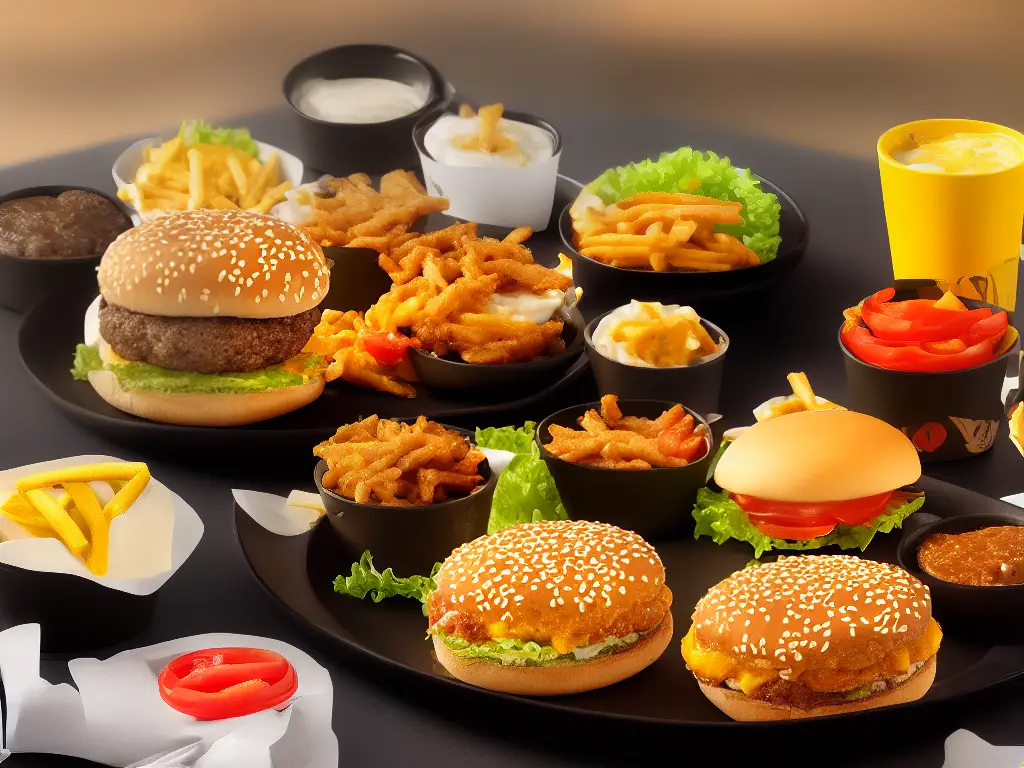
Cultural Influence
Beyond their mouthwatering desserts, McDonald’s has made a significant cultural impact in Brazil. As a global fast-food giant, McDonald’s offers a uniform menu and experience worldwide. However, in Brazil, the company has successfully adapted to local tastes and preferences while retaining its global identity. This careful blending of international standards and regional flavors has helped McDonald’s become a popular and integral part of the Brazilian food culture.
One of the most notable adaptations of McDonald’s in Brazil is the creation of the McMax Brazil burger. The McMax is a giant-sized hamburger made with two beef patties, lettuce, tomato, cheese, and special sauce. This unique burger caters to the preference for larger portion sizes and an intense, savory flavor profile in Brazilian cuisine. The introduction of this locally inspired menu item has played a key role in enticing Brazilian consumers and increasing the company’s market share in the country.
In an effort to appeal to the diverse taste buds of the Brazilian population, McDonald’s has also introduced regional menu items that incorporate Brazilian flavors and ingredients. For example, the fast-food chain offers a banana-flavored pie known as “Torta de Banana”, Tasty Rio-style (served with mayonnaise, lettuce, and tomato), and even McFlurry made with traditional Brazilian chocolates like “Diamante Negro” and “Laka”. These tailored menu offerings not only help McDonald’s cater to the cravings of the Brazilian public but also create a sense of familiarity and cultural connection with the brand.
In response to competition from local Brazilian fast-food chains and international competitors, McDonald’s has taken various measures to ensure its continued success in the Brazilian market. Examples of this include investing in infrastructure to support local sourcing, collaborating with Brazilian franchise partners to maintain a strong presence, and promoting unique marketing campaigns that appeal to Brazilian consumers. These efforts are aimed at positioning McDonald’s as a reliable and beloved fast-food option that consumers can trust and depend on for quality and consistency.
McDonald’s commitment to corporate social responsibility and community involvement in Brazil has deeply ingrained the brand in local culture. Their efforts include supporting youth employment programs, participating in various community events, and implementing eco-friendly practices in their operations. These initiatives serve to strengthen McDonald’s relationship with the Brazilian public and showcase the company’s care for the communities it serves.

McDonald’s Brazil Supply Chain and Local Sourcing
Furthermore, McDonald’s Brazil has consistently shown a strong commitment to supporting local agriculture and businesses through its sourcing and supplier relationships. This dedication plays a significant role in the development of products such as the McDonald’s McMax Brazil, as well as the overall operations of McDonald’s Brazil. By sourcing locally, McDonald’s not only stimulates the Brazilian economy, but also ensures the freshness and quality of the ingredients in its products, creating a seamless connection between the company’s community engagement and product offerings.
One of the key components of McDonald’s Brazil’s supply chain is its investment in local farmers, which is demonstrated through the creation of sustainable sourcing programs. For example, McDonald’s Brazil has partnered with more than 100 local Brazilian farmers to develop a traceability program that enables the identification of the origin of each batch of potatoes used in their products. This program ensures that the farms follow sustainable practices, while also allowing McDonald’s to guarantee the quality of its potato supply.
In addition to partnering with local farmers, McDonald’s Brazil has also developed close working relationships with local suppliers. For instance, McDonald’s Brazil sources its beef exclusively from Brazilian suppliers that adhere to the company’s rigorous food safety and quality standards. Furthermore, McDonald’s Brazil is part of a global commitment to eliminate deforestation in its beef supply chain. As a result, the company has implemented a tracking system to monitor and validate that the beef originates from areas without deforestation, promoting the responsible use of natural resources.
Another example of McDonald’s Brazil’s commitment to local sourcing is their partnership with a Brazilian-owned company, Seara, to provide 100% locally produced chicken. This collaboration allows McDonald’s to maintain a consistent supply of high-quality poultry while supporting Brazilian businesses and reducing carbon emissions generated by transportation from foreign suppliers.
McDonald’s Brazil is committed to local sourcing, prioritizing the procurement of Brazilian products, such as fruits and vegetables, from a variety of domestic farms. This approach allows McDonald’s Brazil to maintain a strong connection to its domestic supply chain and foster long-lasting relationships with the country’s agriculture industry. By focusing on ethical and sustainable supply chain practices, McDonald’s emphasizes the importance of the local economy and businesses in its operations.
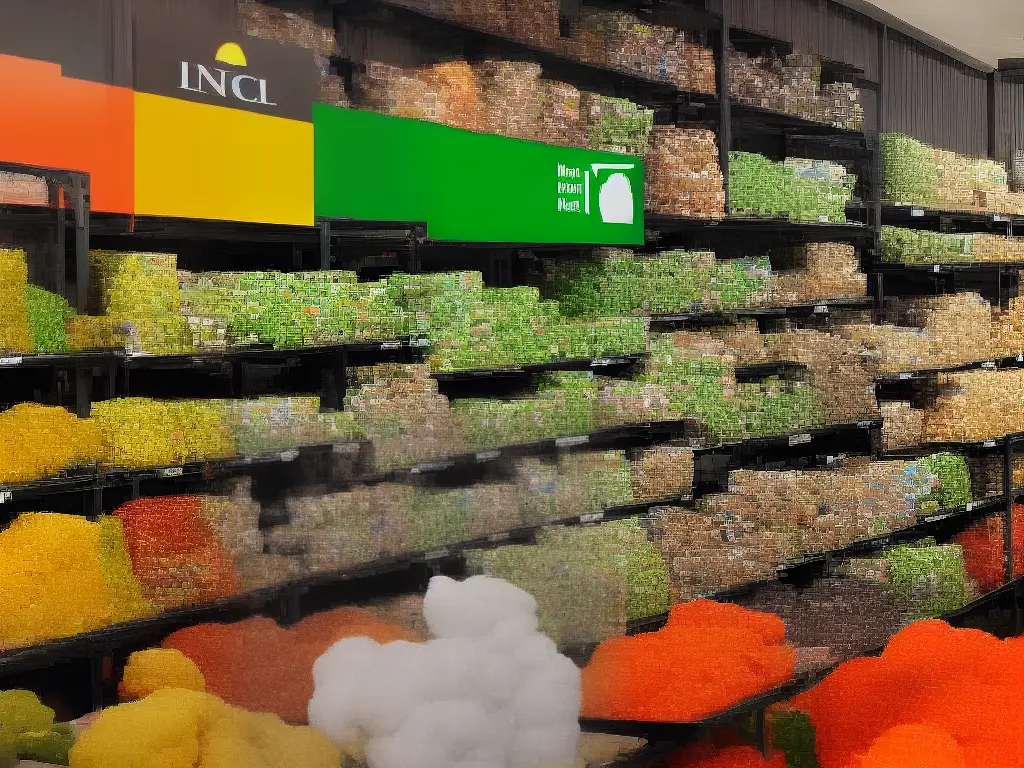
Marketing Strategies
Building upon their commitment to the local community, McDonald’s Brazil utilizes effective marketing strategies that resonate with the country’s passion for soccer. Brazil has the highest percentage of soccer fans in the world with approximately 72% of the population being supporters, according to Glocalities research. As a result, McDonald’s has sponsored various soccer events and teams, including the Brazilian national team and local clubs like Flamengo and Palmeiras. Furthermore, the company leverages advertising campaigns featuring popular soccer players to captivate the Brazilian audience and associate the brand with national pride and the beloved sport.
McDonald’s also collaborates with local brands and celebrities to create limited-time menu offerings and promotions that cater to the tastes and preferences of the Brazilian market. For instance, McDonald’s partnered with popular Brazilian chef Heloisa Bacellar to introduce McMax Brazil, a burger with a distinctly Brazilian flavor profile featuring ingredients like kale, cream cheese, and passionfruit sauce. These local partnerships allow McDonald’s to provide offerings that resonate with the Brazilian audience, while also generating buzz through new product launches and celebrity endorsements.
Understanding the importance of digital marketing and social media in today’s world, McDonald’s has invested in creating an engaging online presence in Brazil. The brand actively posts on its Brazilian social media profiles, sharing updates on new menu offerings, promotions, and events. McDonald’s Brazil has also embraced influencer marketing, partnering with local influencers and vloggers to generate content around its products and promotions. This has helped McDonald’s reach a wider audience in Brazil, particularly the younger generation who are more actively engaged with social media platforms.
In addition to this, McDonald’s has explored the use of digital applications and mobile marketing to connect with Brazilian customers more effectively. One such initiative is Méqui Zap, a WhatsApp-based customer service and ordering service available to customers in several Brazilian cities. This platform allows McDonald’s to engage customers through a communication channel they are already using regularly while providing a convenient way for customers to place orders and receive personalized promotions.
McDonald’s places great emphasis on the overall customer experience at its Brazilian locations by investing in store design and technology to create a modern and inviting atmosphere. The implementation of self-ordering kiosks, table service, and customizable orders have all contributed to this experience. These efforts, combined with the brand’s advertising campaigns and digital marketing initiatives, have enabled McDonald’s to grow and maintain its presence in Brazil. By staying in tune with local market preferences and adapting its marketing strategy accordingly, McDonald’s aims to foster loyalty and remain relevant in the rapidly-evolving Brazilian fast-food landscape.
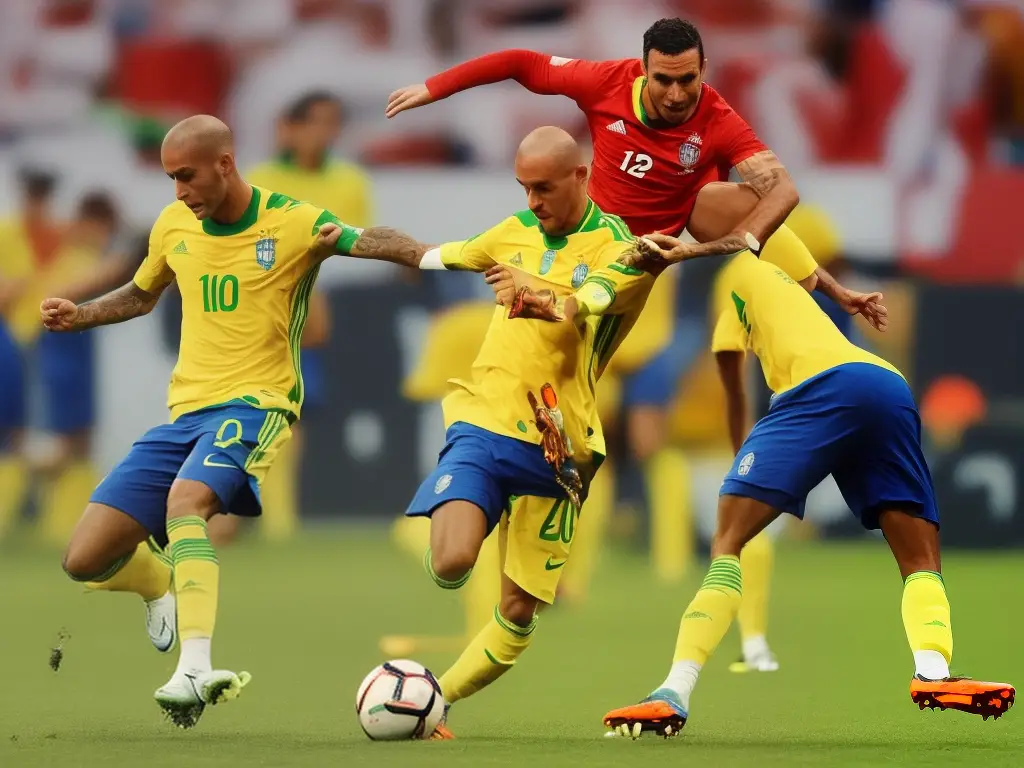
Corporate Social Responsibility
Further enhancing its reputation in Brazil, McDonald’s is highly committed to corporate social responsibility (CSR) initiatives, including environmental sustainability. Recognizing the global issue of climate change, McDonald’s Brazil has been working to minimize its environmental impact by investing in modern technology and eco-friendly practices. These efforts aim to reduce energy consumption and waste production in their restaurants. The combination of an enhanced customer experience and a focus on CSR initiatives demonstrates McDonald’s dedication to creating a positive relationship with consumers and the environment in Brazil.
One of the remarkable environmental initiatives in Brazil includes the construction of the first McDonald’s restaurant with a LEED (Leadership in Energy and Environmental Design) Gold certification in Brazil. This demonstrates McDonald’s commitment to reducing its environmental footprint and promoting sustainability.
The eco-friendly restaurant features solar panels for energy generation, intelligent air conditioning systems, low-flow faucets to reduce water consumption, and waste management systems to recycle and compost waste. This initiative not only helps to protect the environment but also serves as a model for future sustainable construction in Brazil.
In addition to environmental sustainability, McDonald’s Brazil also focuses on community involvement. They strive to engage with their local communities and make a positive impact through various social initiatives.
One such effort is the “Bom Vizinho” (Good Neighbor) program, through which McDonald’s Brazil organizes events such as food donations, clothing drives, and fundraising campaigns for local non-profit organizations. This program aims to foster good relationships with the local communities and demonstrate that McDonald’s is a socially responsible company that genuinely cares about the well-being of the people it serves.
McDonald’s Brazil also prioritizes workforce development and employee welfare. They offer training and development programs to help their employees grow professionally, and they are committed to providing a safe and inclusive work environment.
McDonald’s Brazil has been recognized for its progressive labor practices and was awarded the “Prêmio Abril & Cia” (April & Co. Award) for being one of the best companies to work for in Brazil. This accolade highlights McDonald’s Brazil’s commitment to employee well-being and professional growth.
McDonald’s Brazil has actively engaged in collaborations with other businesses to promote CSR initiatives, demonstrating their concern for not only their profit margins but also the broader social and economic development of the communities in which they operate.
One such effort is the partnership with Coca-Cola and other companies to launch the ‘Coletivo’ program, which offers training and job opportunities for young people from low-income communities. These investments in the futures of individuals contribute positively to society.
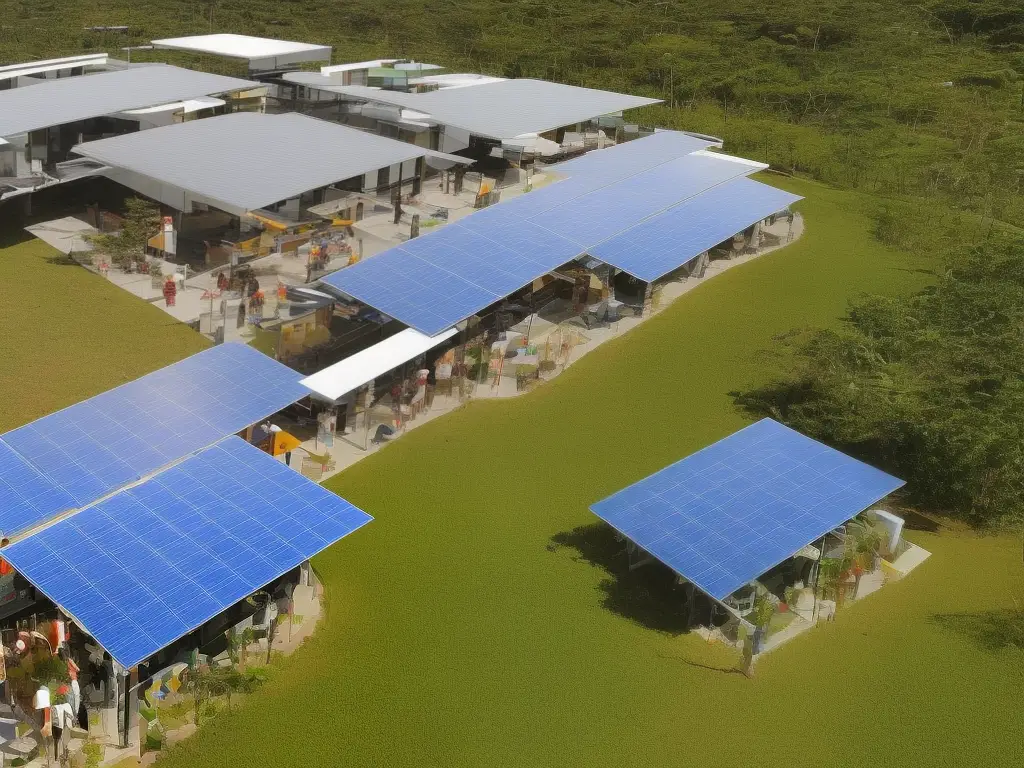
Consumer Perceptions
McDonald’s in Brazil caters to the diverse taste preferences of the country’s population, being perceived as a convenient and affordable fast-food option. As the largest fast-food chain in Brazil, McDonald’s has captured a significant market share by offering a wide range of menu items. Among these offerings is the McMax burger, which is exclusive to the Brazilian market.
The McMax is a premium, locally-inspired burger that features two beef patties, cheddar cheese, lettuce, tomato, and a special sauce. This introduction of the McMax has been well-received by Brazilian consumers, who appreciate localized menu offerings that cater to their taste buds, further showcasing McDonald’s commitment to the local culture and market.
One of the factors contributing to the positive perception of McDonald’s in Brazil is the company’s commitment to incorporating local flavors and ingredients into its menu. In addition to the McMax, McDonald’s Brazil offers other items like the McChicken with Brazilian spices and the McFritas, a side dish consisting of fries mixed with a variety of popular Brazilian seasonings. These localized offerings have helped McDonald’s establish a strong connection with Brazilian consumers and showcase the company’s understanding of the importance of adapting to local tastes and preferences.
However, McDonald’s has also faced some controversies and criticisms in Brazil over the years. One notable controversy in 2011 involved the company’s marketing tactics, specifically targeting children with its Happy Meal promotions. Brazil’s Consumer Defense Institute accused McDonald’s of practicing ******** marketing ******** techniques, which led to a $1.7 million fine from Brazilian regulators. Additionally, the fast-food chain has faced criticism regarding its environmental impact in Brazil, particularly in relation to its role in deforestation in the Amazon rainforest.
The fast-food industry in Brazil has also experienced a growing trend towards healthier options in recent years, leading to increased scrutiny of McDonald’s and other major players in the market. In response to these concerns, McDonald’s has made changes to its menu in Brazil in recent years, incorporating options such as salads and fruit smoothies to cater to customer preferences for healthier alternatives. Furthermore, the company has been working on marketing initiatives to promote the nutritional content of its menu offerings, as well as offering more transparent information about ingredients and their sourcing.
In conclusion, the public perception of McDonald’s in Brazil is a mix of admiration for its localized menu offerings, like the McMax, and criticisms regarding its marketing practices and environmental impact. By adapting to local tastes and preferences, McDonald’s has managed to build a strong brand presence in Brazil. However, some controversies ******** arisen as a result of certain aspects of their business practices. Moving forward, it will be important for McDonald’s to continue offering unique and tailored menu items while addressing the concerns of its consumer base in order to maintain a positive public perception in the Brazilian market.
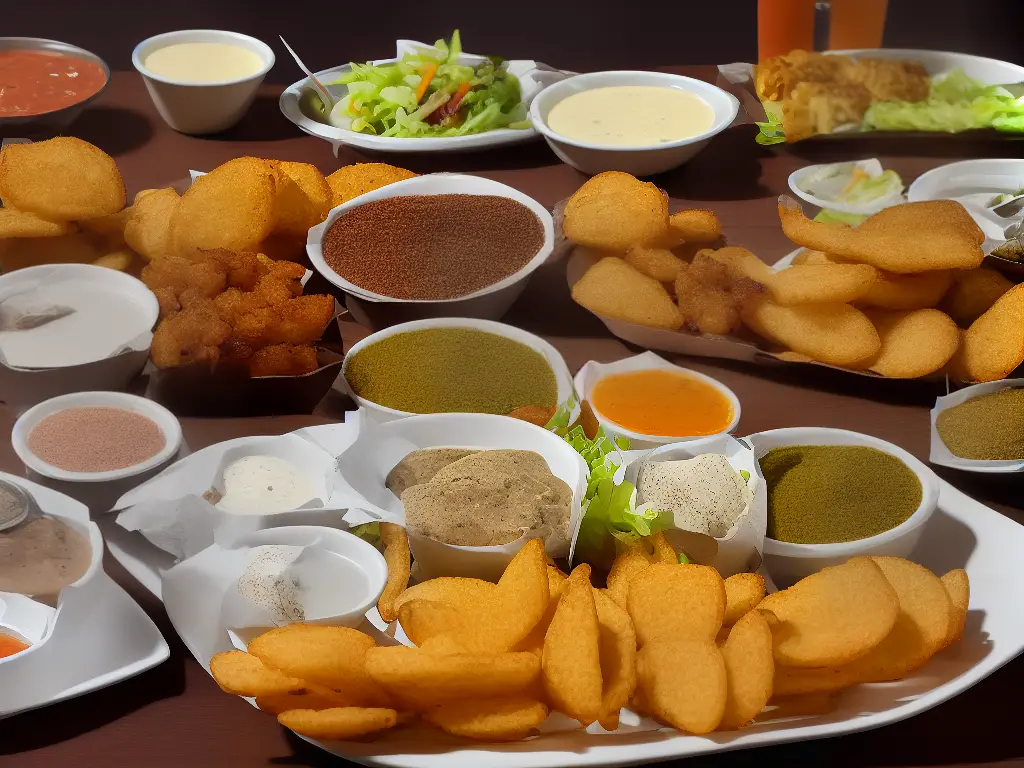
Throughout its time in Brazil, McDonald’s has not only managed to adapt to the unique and vibrant cultures but also has left a lasting impact on the country’s food industry. By continually evolving its menu, embracing local sourcing, and implementing sustainable practices, McDonald’s Brazil has become synonymous with innovation and adaptation. However, understanding consumer perceptions and addressing any controversies is crucial to ensure the ongoing success of McDonald’s in the Brazilian market. Thus, the brand’s story displays the importance of striking the right balance between global appeal and local relevance for any multinational corporation.
